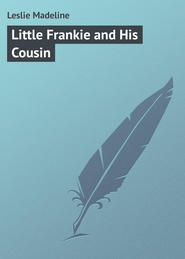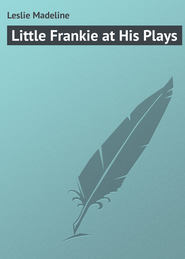По всем вопросам обращайтесь на: info@litportal.ru
(©) 2003-2024.
✖
The Pearl of Love: or, Josey's Gift
Настройки чтения
Размер шрифта
Высота строк
Поля
Though Joseph was so young, yet his parents hoped he had become a lamb of the Good Shepherd. He had faults, as all children have; but he tried to correct them. His face sometimes flushed when Emma teased him or meddled with his books, of which he was very careful; but he never struck her now, and seldom was angry but a minute.
"I try to think," he said to his mamma, "that she don't know better, and that she's almost always good; and if I wait a minute and remember about Christ forgiving me, then I feel happy right away."
Josey showed in one way that he was a Christian child. He loved everybody, and tried to be good to all.
Among the poor people belonging to his father's church, no one was more welcome to their humble cottages than little Josey. He always had a pleasant word for each, and often spent hours of his play-time in reading to the old women of the parish.
At Christmas, his greatest treat, and one that he spent weeks in preparing for, was to take his box sled (the one he drew his sister in,) and fill it with the presents he had prepared for his friends.
"Though they are poor," he said, over and over, "I love them dearly, and I want to have them know it." So he spent all his pocket-money in buying what mamma and Aunt Fanny thought would be useful.
A pair of mittens for one poor orphan, a flannel shirt for a rheumatic old man, a pair of glasses for another, and plenty of pies, which he had hired cook to make. He hired her, because he wanted to feel that the gifts were his and not his mother's.
Do you wonder every body, rich and poor, loved him, and that, wherever he went, blessings were showered on his head?
I don't mean those worthless words that so many beggars use without meaning: "A thousand blessings on your head, Miss."
Oh, no! But real, heart-felt prayers that God would be his Father and Friend forever.
Do you suppose Josey was a cross, sulky boy? Can you imagine him wearing a frown? or with his lips in an ugly pout?
No, indeed! It is not possible for one who cultivates such love for all around him; for one who tries in this way to imitate the example of his blessed Saviour to be unhappy or cross. Those children who think only of themselves, who are selfish and greedy, who never heed the blessed words, "Be ye kind one to another," are the persons to wear sour faces and pouting lips.
Don't you remember what the good Book says, "Her ways are ways of pleasantness and all her paths are peace." That means Wisdom's ways, and one of these paths is love; love to God and love to those around us.
You can well imagine that Josey's father and mother, and aunt and nurse, were delighted in seeing him growing up to be a good boy; and each of them were ready to assist him in correcting his faults.
He was neat and orderly; keeping his little treasures arranged nicely in the drawers mamma gave him, and his clothes each on their own hooks in his closet. But Joseph was not always prompt in attention to his duties. He liked so much to hear the talk at table or at the fireside, that it was a real trial to him to leave the pleasant company, and the delightful things that were being said; and he often lingered when he ought to have been on his way to school.
Aunt Fanny used sometimes, by an anxious glance toward the clock, to remind him of his duty, for she hated to have her favorite reproved; or his mamma would say gently, "You'll be late again, Josey." If the conversation was very interesting, he would only push back his chair a little and wait for papa to say, —
"My son, go this moment."
One day his mamma had a long talk with him on the subject of procrastination, after which he did much better.
She explained to him that the meaning of the command, "Honor thy father and thy mother," was not only that a child must obey when told to "go" or "stay;" but he must strive in every thing to act as would please them. He must honor them by anticipating their wishes, by acting when they were absent as he knew they would approve if they were present.
She told him that he could please the Lord Jesus by a dutiful attention to their desires, such as, always to be in season for school, or punctual to any engagement, just as much as by being honest and truthful. The dear Saviour would look into his heart and know he was trying to do right out of love for him.
CHAPTER VI.
THE BURNED BABY
The winter after Josey was eight years old, his parents received a visit from their dear friends Mr. and Mrs. Matthews and little Rose. Two infant brothers had died since they last met, and Rose was still their only daughter.
Emma was now in her fifth year, and Rose only a few weeks younger.
Many a time during the visit, did the mothers and Aunt Fanny talk over the mistake made by Mrs. Reed, at which no one was more sorry than Mrs. Reed herself. Many a time they laughed over the question of the cross driver:
"Why wont one do as well as t'other?"
The man had married afterward, and when a tiny babe was put into his arms, and he was told it was his own, he understood well why every father and mother love their own children best.
Aunt Fanny was soon going to leave the country. They had all been busy for months in getting her clothes ready for the voyage, and a missionary society in the village were making shirts, etc., for her friend, Mr. Barnard.
One afternoon, she walked to the village to give some directions that had been requested, and took the opportunity to make her last calls on some of her poor families.
The tea hour passed, and she did not return. Her brother did not know where she was gone, so they were obliged to wait patiently for her return, though Josey grew every moment more anxious.
At last it was within half an hour of his bedtime, – Emma and Rose had long before gone to their cribs, – when Aunt Fanny's welcome voice was heard.
She looked very pale, and all knew at once that something must have happened. She motioned Josey to her side, and laid her head on his shoulder as he stood by. Presently she exclaimed, —
"I have seen a dreadful sight! Oh, I never can get it out of my mind! The screams and shrieks, I hear them yet!"
"What is it? do tell us," urged her sister.
"You know little Juley Lane, what a passionate child she has always been. I told Mrs. Lane the last time I was there, it wasn't safe to leave her with the baby. She didn't seem to have any love for him. Now she's killed him."
Josey gave a start and sob of horror, while Mrs. Codman exclaimed, —
"Shocking! terrible! how did it happen?"
"I was making calls," added Fanny, with a groan, "and I met Mrs. Lane. She was hurrying with a basket of clean clothes, and told me she'd been obliged to leave Juley with her old mother and the baby. I told her I was going to call, which relieved her anxiety, and she said she'd be home in a short time.
"Long before I reached the house I heard awful groans, and on opening the door, what a sight was before me.
"Mrs. Lane, thinking the baby would be safer, had tied him into the high chair, and set him in front of the stove. Julia had one of her fits of anger and pushed him over. His poor hands and face fell upon the hot iron and burned to a crisp. When I went in, the old woman had crawled on her hands and feet, to the place, and was trying, with her poor deformed fingers, to release him. Juley stood by, frightened and crying, but not able to do anything.
"I flew to untie him from his chair, which was in a bright blaze, and then rushed to the door to send for a doctor. Then the mother came. Oh, dear! I wouldn't go through such a scene again for a kingdom. I don't believe the poor child was conscious; the doctor thought not; but such a sight! You wouldn't know him from a piece of burnt wood; and there he lay, only showing he was alive by a feeble groan.
"Mrs. Lane shrieked and tore her hair, and when Juley pulled her dress, I was afraid she'd kill her, too. So I got a neighbor to carry her off, screaming and fighting. The old woman hasn't been across the room before by herself for a year, and now lies speechless on the bed; I don't believe she'll live till morning."
Mr. Codman put on his hat directly and hurried away to the distressed family, while his wife took off Fanny's hat, and brought her a cup of tea, begging her to try and eat a piece of toast.
"You'll be sick, dear, if you don't," she urged. "The shock has been too much for you."
"I can't hold the cup;" sobbed Fanny, giving way at last; and then she held up her poor burned hands and arms.
"Oh! oh dear!" screamed her sister.
"My poor, poor girl!" exclaimed Mrs. Matthews; and then they and Josey and Nurse all cried together.
In less than half an hour Mr. Codman returned, and the doctor with him.
The old woman had breathed her last. Fanny had saved her from burning to death, by tearing off her blazing clothes at the risk of her own life. The neighbors all said Miss Fanny was an angel. If it had not been for her presence of mind, the house would have been burned, and the widow have lost everything.
The doctor bound up the poor, blistered hands and arms, talking cheerfully as he did so, but, his eyes grew moist as he told them afterward what she had done.











